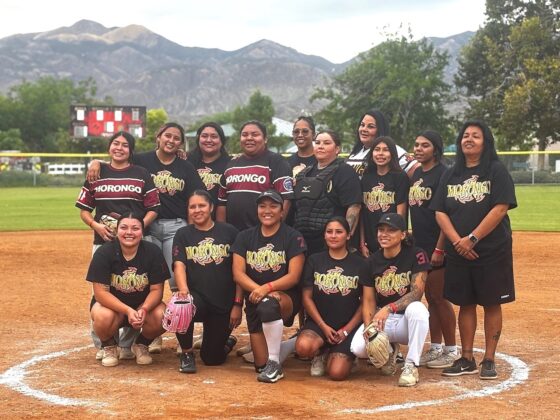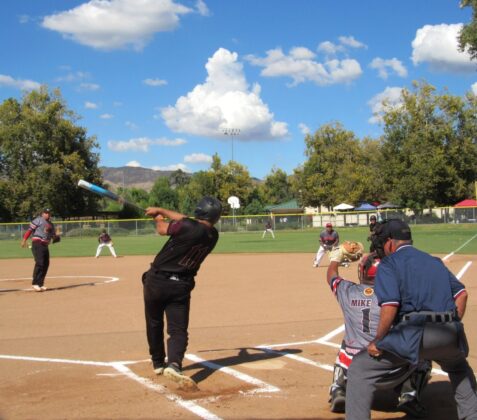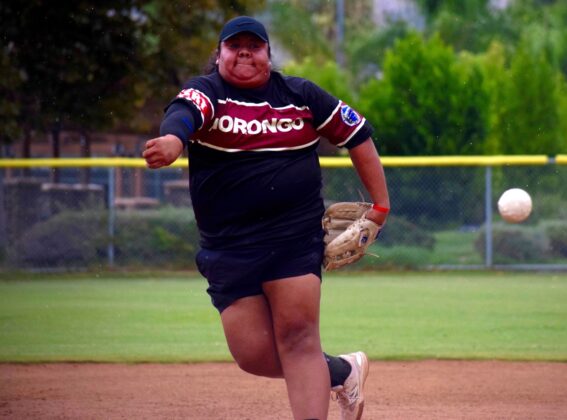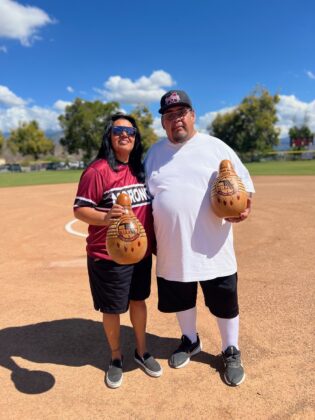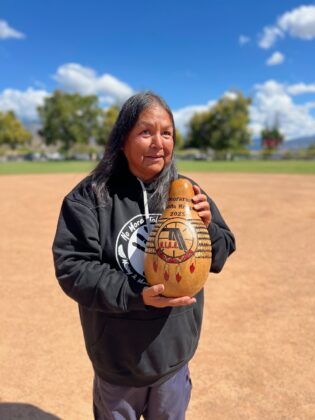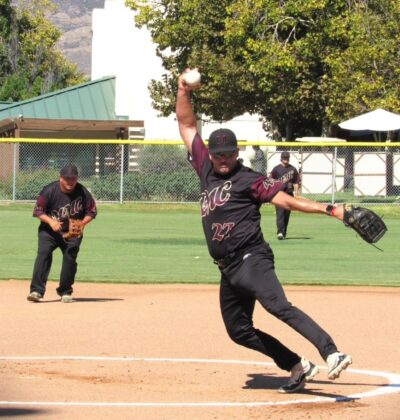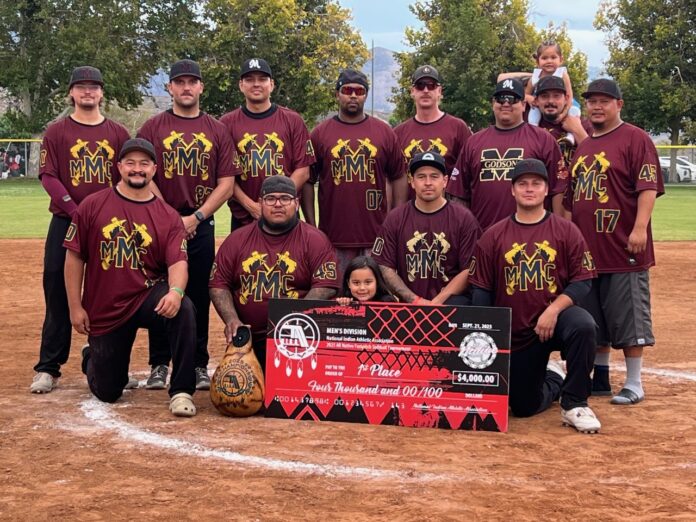
Soboba Band of Luiseño Indians
Special to Valley News
The Soboba Indian Reservation was the site for the 2025 National Indian Athletics Association All Native Fastpitch tournament, Sept. 19-21. For nearly two decades, the Soboba Band of Luiseño Indians has proudly hosted the event that draws players from several states and Canada.
A record number of men’s teams at 19, plus 15 women’s teams, competed during the weekend of games that began at 3 p.m. Friday and ended with the championship games on Sunday afternoon. Playing at two fields at the Soboba Sports Complex and three fields at The Oaks, the competition was fierce.
Taking home top honors for the men were returning champions Morongo Men’s Club (MMC), while the Morongo Women also scored in the number one spot again this year.
Other top winners in the Men’s Division were second-place Cali Redz, third-place Manderson A’s from South Dakota, and Beernuts, who placed fourth. Vincent Nelson (Rincon) with Cali Redz was named MVP Pitcher. Stevie Silvas (Soboba) from MMC earned the MVP Player award.
The Women’s Division saw Rezilience taking second place, O’odham from Arizona in third and Lady Beernuts as fourth-place finishers. MVP Pitcher honors went to Kali Sargent (Washoe) with the Morongo Women, and Arlene Stone (Bishop Paiute) from the Rezilience team was named MVP Player.
During the opening ceremonies on Friday, Sept. 19, N.I.A.A. Committee member and Soboba Tribal Council Vice Chairwoman Geneva Mojado introduced other members and thanked vendors, players and volunteers “who help make NIAA possible.”
“Welcome to our homeland; we like to call it God’s Country,” Mojado, who served as coach and pitcher for the Soboba women’s team this year, told the crowd. Tenisha Masiel Vargas (Pechanga) also pitched, and Doris Placencia served as Assistant Coach for the Soboba team.
Members of the Soboba Tribal Council said, “This is more than a tournament—it is a celebration of tradition, unity, and the joy of the game. We hope your weekend is filled with memorable moments, new friendships, and the continuing strength of our shared community.”
Each year, the NIAA volunteers choose the honorariums, or suggestions are given to the committee from softball families. This year, three were honored at the opening ceremonies: Frank “Smudge” Miguel with the Morongo Men’s Club, “Non” Miguel with the Morongo Women, and Anita Kruger from Canada.
Mojado said she loved the opening ceremonies, especially surprising Anita and recognizing Frank and Non. “It was exciting,” she said. “Having all family, friends, and teammates be present was great.”
Frank Miguel Sr. was introduced as a cornerstone of the Morongo Men’s Club, leaving an enduring mark on the team and community through his leadership, dedication, and love for the game. He started playing outfield for MMC when he was 12 years old. By 1983, Frank had expanded his role on the field, stepping into the pitcher’s circle and establishing himself as a versatile and reliable player. After decades of service, Frank retired from active play in 2010, passing the torch to his son and keeping the family tradition alive. For more than four decades, Frank Sr. has been both a force and an anchor—a steady presence whose vision, hard work, and dedication helped shape the Morongo Men’s Club into what it is today.
Non Miguel has been a proud and dedicated figure in women’s fastpitch softball across Indian Country for decades. Known for her leadership, mentorship, and competitive spirit, she has guided multiple teams to championship victories and inspired generations of Native athletes. In 2006, she led her team to a gold medal victory in Denver, cementing their place among the top teams in the sport. In 2011, Non brought the Morongo Women to Nevada for the All-Native Worlds, where they captured the Championship title. Non has the ability not only to build strong, competitive teams, but also to foster unity, resilience, and pride among Native athletes on and off the field. Her legacy is carried on through the young women she has coached, mentored, and inspired to follow in her footsteps.
Juanita “Anita” Kruger began playing ball with her brothers when she was 12 years old and has been pitching since she was 13. The first ladies’ team she played for was The Bravettes. Over the years, she has played with more than 50 different teams, the longest being Field of Dreams (LNG). She has traveled throughout North America and to Australia, Italy and New Zealand, showing her love and dedication to the game. Anita, who has pitched against men and women, is still well known for her unique pitching styles and striking out the best of the best. The one pitch she became best known for is the one where she would bend over and hide her pitch behind her hair.
Each honorarium recipient threw out a ceremonial first pitch to much applause from the spectators, as well as horn honking from vehicles parked outside the ballfield’s chain link fence.
One of the first games of the tournament took place at the Soboba Sports Complex Field 1 between the Morongo Men’s Club and the Cali Redz, which the MMC won.
Field 2 saw the $ovòova (Soboba) men take on the Kumeyaay Kuumarr from San Diego County, with the latter taking the win in the opening game. Although these players have competed before, this marked their first appearance with this team line-up in an NIAA tournament.
Coach Josiah Richardson (Barona) of the Kumeyaay Kuumarr team said his team has been together for about six months, although many players have been with other teams before.
“I enjoy playing with my Native brothers, cousins, and family,” Richardson said.
Phill Basquez (Soboba), who coached the $ovòova team with assistance from Steve Medina, said the current line-up has been together for about a month. Most have played multiple positions so they had to decide who would play where for this team. “Everyone is pretty solid,” Basquez said.
Each team was given a three-game guarantee with varying lengths of time between games. Basquez said being local to the Soboba reservation allowed them to go home in between games to relax.
“I was very pleased with this year’s tournament,” Mojado said. “It gets bigger and better every year.”




